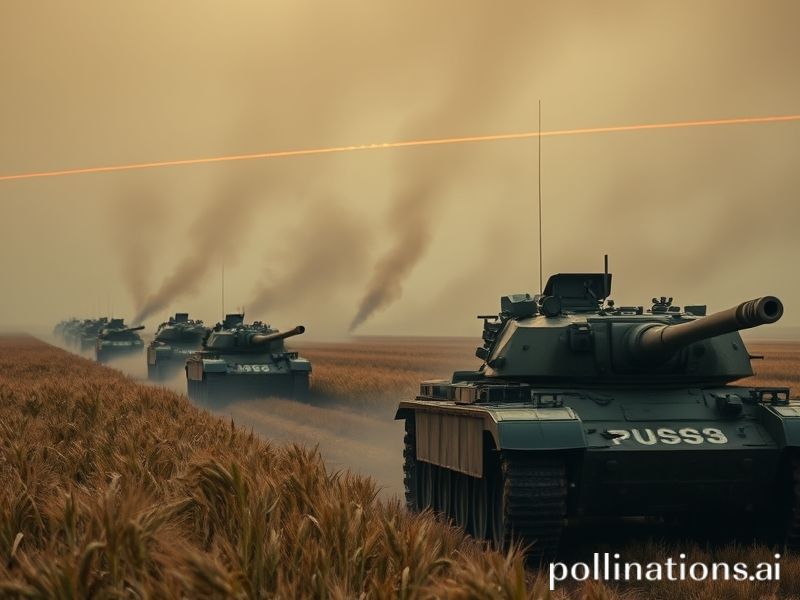When Bears Waltz, Markets Stumble: A Sardonic Global Play-by-Play of Russia’s Polish Gambit
The Poles have an old saying: “When the Russian bear dances, everyone else pays the cover charge.” Last night the bear lumbered over the border and tried to waltz into Przemyśl, apparently forgetting that the last time Moscow “dropped by” uninvited, Poland redesigned half the Red Army with cavalry sabres. This time the sabres have been upgraded to F-35s, and—because even geopolitical catastrophe must have its silver linings—Warsaw’s nightlife has never been livelier; locals are partying like it’s 1939, only now the playlist is techno, the cocktails are NATO-branded, and the bouncers speak seven languages.
Global markets, never ones to miss a good panic, reacted as expected. The Nikkei plummeted faster than a conscript’s morale, Brent crude did its best Bitcoin impression, and somewhere in Davos an economist spilled kombucha on his Patagonia vest trying to short the złoty. Meanwhile, the Twitterati pivoted from arguing about the pronunciation of “Kyiv” to arguing about the pronunciation of “Oświęcim,” proving that the internet can indeed multitask Armageddon with phonetic pedantry.
Washington, fresh from a midterm hangover, declared the attack “unprovoked, unacceptable, and—let’s be honest—on brand.” Congress briefly paused its regularly scheduled dysfunction to approve emergency aid, which will be delivered sometime between the next debt-ceiling crisis and the heat death of the universe. The Pentagon leaked that U.S. special forces are already “advising” on the ground; their camouflage reportedly blends seamlessly with Warsaw’s neon club scene. Across the Channel, a visibly relieved Downing Street announced that, having outsourced British foreign policy to anyone with a louder microphone, it will “study the situation closely,” which is Mandarin for “let the Americans handle it.”
Berlin, still apologizing for that earlier unpleasantness in Polish territory, offered a strongly worded hashtag and two battalions of solar-powered tanks—assuming the sun cooperates. Paris, determined to remain Paris, suggested a tasteful EU summit in Avignon, with breakout sessions on existential dread and artisanal cheese. Rome promised support, then promptly fell, because some traditions never die.
Beijing, perennially delighted to see the West stub its toe, issued a statement urging “all sides to exercise restraint,” which loosely translates to “please keep punching each other; we’re having a fire sale on cheap microchips.” Moscow, for its part, insists the incursion was merely a “special cartographic operation” aimed at correcting a clerical error from 1945. The Kremlin’s press secretary reassured reporters that any mushroom clouds are purely coincidental and definitely not evidence of a wider war—just a very enthusiastic fireworks display for Constitution Day.
In the Global South, reactions ranged from weary solidarity to profitable neutrality. Lagos remembers when European borders were drawn by drunk cartographers; Nairobi notes that refugee crises are only fashionable when the refugees have blue eyes; Buenos Aires offers thoughts, prayers, and discounted soybeans. At the UN, the Security Council convened an emergency session that accomplished nothing, except to confirm that the espresso machine on the 38th floor still works. Secretary-General Guterres expressed “grave concern,” which is diplo-speak for “I’m updating my LinkedIn.”
And yet, amid the gallows humor and recycled press releases, something quietly shifted. Finland and Sweden—those famously non-aligned neighbors who once considered NATO a bit too clingy—suddenly found the alliance remarkably attractive, like realizing the weird kid at school now owns all the good snacks. Japan discovered a sudden interest in long-range missiles; South Korea remembered that deterrence is best served hot. Even Switzerland broke character and froze a few oligarch accounts, proving that money, like water, eventually finds its level—usually in a Geneva safe-deposit box.
So here we are again, rehearsing the 20th century with better graphics. History doesn’t repeat itself, but it does binge-watch its own reruns, occasionally pausing to laugh at the viewer engagement metrics. The bear is dancing, Europe is balancing on a barstool, and the rest of the planet is live-streaming the spectacle while placing side bets. If there’s a moral, it’s that borders are just lines until someone with a tank decides they’re more like suggestions. For now, Warsaw holds the line, the world holds its breath, and somewhere in Silicon Valley a startup is already prototyping an app that translates incoming artillery into push notifications. Five-star rating pending, of course.







